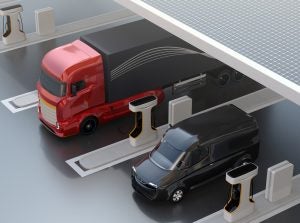New multi-state collaboration makes an important commitment to electric trucks and buses
 As our nation grapples with a historic public health crisis, 15 states and the District of Columbia are showing leadership by committing to address a dangerous culprit that makes us more vulnerable to COVID-19 and climate change: diesel pollution from trucks and buses.
As our nation grapples with a historic public health crisis, 15 states and the District of Columbia are showing leadership by committing to address a dangerous culprit that makes us more vulnerable to COVID-19 and climate change: diesel pollution from trucks and buses.
These pollutants have significant negative consequences on air quality and health. Despite comprising just 10% of vehicles on the road across the U.S., trucks and buses are responsible for 57% of fine particulate matter, 45% of oxides of nitrogen and 28% of greenhouse gas emissions for that sector.
Besides increased planetary warming, pollution from diesel vehicles leads to a higher rate of asthma, heart attacks and premature deaths — ailments that disproportionately affect people of color and disadvantaged communities, which often border freight corridors, ports and depots. A growing body of evidence suggests that people with respiratory illnesses, often caused or exacerbated by transportation-related pollution, are more susceptible to the effects of COVID-19.
That’s why today’s announcement from California, Colorado, Connecticut, Hawaii, Maine, Maryland, Massachusetts, New Jersey, New York, North Carolina, Oregon, Pennsylvania, Rhode Island, Vermont, and Washington, as well as the District of Columbia, to collaborate on a plan that will put more electric trucks and buses on U.S. roads is so important.
The new multi-state “memorandum of understanding” aims to support and accelerate the deployment of medium- and heavy-duty zero-emission vehicles through a collaborative process facilitated by the Northeast States for Coordinated Air Use Management (NESCAUM).
New multi-state collaboration makes an important commitment to electric trucks and buses Share on XA much-needed policy signal
The growing number of high-quality zero-emission purchase options available for transit buses, school buses and local delivery vans show the market is ready for this type of policy signal. Many leading fleet operators already have zero-emission trucks on the road.
A major reason for the shift towards electric vehicles? Fleets and manufacturers recognize long-term potential for major cost savings. Market analysts forecast that light-duty electric trucks will achieve a lower total cost of ownership than trucks that run on internal combustion engines — even absent incentives — as early as 2021, and that medium- and heavy-duty trucks are likely to follow by the end of the decade.
Creating strong policies that support the transition to electric will also increase economic opportunities in a stable, growing segment of the energy market, while helping states build back better.
For example, California’s landmark Advanced Clean Truck rule is expected to save the state economy at least $7 billion over the next 20 years and create thousands of new jobs by 2035 — thanks in part to the build out and installation of new electric charging infrastructure. This transition to clean vehicles will improve bad air quality that contributes to a higher number of missed workdays and hospital visits each year, helping to lower health costs.
The road ahead
This announcement is the first step on the road to a more specific, comprehensive plan. Over the coming months, the states are expected to develop a model action plan, after which individual states will develop their own tailored plans in order to ensure they can electrify vehicles most effectively for their circumstances.
Through the planning process, EDF, along with other key stakeholders, will encourage participating states to adopt robust targets and a comprehensive set of policies for driving the adoption of zero-emission trucks. We will also continue to bring other states on board this historic initiative.
To achieve a near-total transition to electric trucks and buses by 2050, at least 30% of the entire new medium- and heavy-duty market across the U.S. must be zero-emission by 2030. States should move swiftly to implement their plans and achieve this level of ambition, and EDF will urge them to do so.
It’s imperative to demonstrate a commitment to building a more sustainable economy as we emerge from the COVID and economic crises. Supporting the deployment of zero-emission trucks and buses is an important step that can help put Americans back to work while protecting our health and climate.










